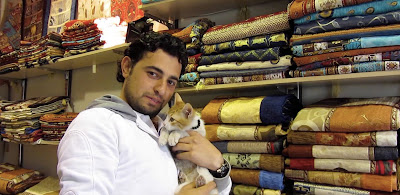 |
Üsküdar, Istanbul/May 9, 2012 - Yön için sorma/
Asking for directions (photo: Shea McJagger) |
In the first few days in Turkey I tried to open my ears on how Turkish people talk. After training for about seven months will I be able to use what I've learned to communicate? Even though, in Istanbul you can survive with speaking only English.
Knowing a few words has it's advantages though... especially in ordering food, bargaining and up to a point asking for directions.
Although I have mastered quite a bit of vocabulary, building sentences is a different matter all together and understanding native speakers talk is not easy. Turkish people speak very fast and with relatively flat tone.
The people I tried to communicate with was being so kind by tolerating my one-word sentences. I mostly get by using a lot of gestures, basic expressions such as "tuvalet nerede?" when asking for the toilet; "teşekkürler" when saying thanks.
Small talks when meeting people... "Nasılsın?"...How are you? ...and responding "İyiyim, teşekkürler" ...I am well, thank you. "Yardım bana biraz"... Help me a bit... People will also ask where I am from... maybe its something like "Nerelisin?" and I will answer "Endonezya'da"... I am surprised at how many people actually know where Indonesia is!
The guys at the hostel reception was very helpful in teaching me some more expressions... "Her yolunda?" means something like "How's it going?" literally meaning "Everything going on track?" and the answer can be "Yolunda"... or when things are going very well: "Süper gidiyor herşey!"
Being brave in asking questions means you have to get ready to receive an answer! Bargaining is quite straight forward... "Kaç para?" or "Ne kadar?" when asking for price... I can count so usually getting an answer is no problem... but when it comes to asking for directions, ehm.. that's a different story...
In Üsküdar, we got lost and strolled into a residential area... I did bring a map and yes... I did have a GPS with me... but sort of didn't mind getting lost :) ...so we came across a small shop where I stopped to buy a sandwich. Afterwards I asked him the direction to the Çinili Hamam. He hesitated a bit (oh oh not a good sign... it will be very far and complicated... and yes... it was...) ...he started to give directions... go right, then straight ....bla bla bla... I said I don't understand but it seems that he didn't believe me... he said you know the word for 'olive' (...I wanted to say I am asking for directions and my olives can't give me directions!) ... so he went on with his long and complicated explanation, and I just put on a serious face as if I understand and quickly get out of there ...he he...
We never made it to the Çinili Hamam... as soon as we came out to the main street, we took a dolmuş (shared taxi) to Kadıköy and took a ferry back to Eminönü...







